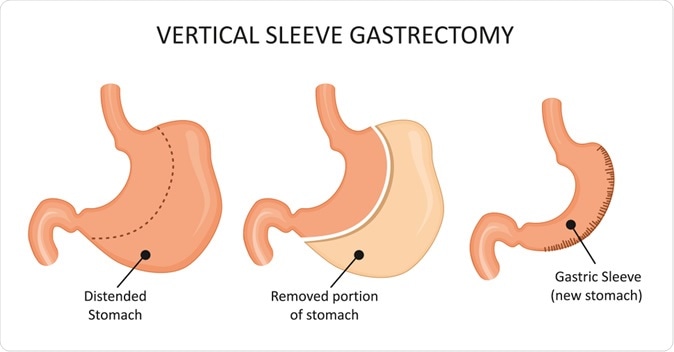A new study that analyses the outcomes of many thousands of patients who had bariatric surgery reports that repeat hospitalization is much more likely with those who had gastric bypass surgery than with gastric sleeve surgery.

Vertical sleeve gastrectomy. Stomach reduction surgery. Image Credit: logika600 / Shutterstock
Bariatric surgery is a more effective way to treat obesity and to induce a remission of type 2 diabetes mellitus compared to other non-operative measures in very obese individuals.
Comments researcher Anita Courcoulas, a specialist in minimally invasive bariatric surgery, “"In bariatric surgery, there has been an explosion of data, but most focuses on positive outcomes. This study is important because it includes adverse events people might be concerned about.”
For instance, short-term risks for various procedures follow a gradient, and generally the more complex procedures have a greater risk of death or adverse events. However, long-term risks include the rate of repeat surgery, which are much higher with low-complexity procedures like adjustable gastric banding (AGB). This has led to, for instance, a fall in the number of AGB) carried out all over the world.
The study
The researchers looked at electronic medical records taken from about 33,500 patients who had undergone bariatric surgery at 10 medical facilities over the period 2000 to 2015. These records were part of the PCORnet (National Patient-Centered Clinical Research Network) Bariatric Study.
The participation of multiple sites was an important part of designing relevance into the study, so that the findings would be applicable to patients from different parts of the US. The link from the electronic health records to health insurance claims and death records is a major step towards ensuring accurate depiction of adverse events, which is often missed if only the reports of the bariatric surgeons are considered.
Of the patients, about half had the Roux-en-Y gastric bypass procedure and the rest a sleeve gastrectomy.
In sleeve gastrectomy, a part of the stomach is excised so that the capacity is reduced, and the patients feels full earlier during meals. This helps patients eat less and thus lose weight. In the Roux-en-Y, the stomach is replaced by a pouch created from the intestine, into which the food enters once it is swallowed. The real stomach is thus bypassed to encourage the eating of small meals.
The scientists examined the data to see what happened five years after the first surgery.
The findings
The researchers found that following a gastric bypass, a significantly greater number had had a second operation or other intervention on an abdominal organ, at about 12% compared to 9% after a gastric sleeve operation. Both the rates of hospital admission and the occurrence of endoscopy were increased after the gastric bypass, though death rates remain the same in both groups.
Sleeve gastrectomy may have greater benefits over the gastric bypass in patients who are less overweight, and who have fewer coexisting illnesses.
The reasons for the increased rate of surgical intervention after the gastric bypass could be its greater complexity, according to Courcoulas, who doesn’t forget that some of these interventions are intended to improve the health such as, for instance, repairing a hernia. The researchers also point out that gastric bypass, while it seems to have slightly greater risks, also can have bigger advantages. In fact, a preceding study examining the same dataset shows that weight loss occurred to a significantly greater extent after gastric bypass than sleeve gastrectomy.
Implications
The researchers hope that these findings will one day help choose the type of bariatric surgery, whether by patients or by the healthcare provider. When both take part in taking clinical decisions, according to Courcoulas, “It starts with a conversation about what their preferences and values are. Some people value low risk, some value high weight loss. It's important to have information on both sides of the risk-benefit equation.” The current study will hopefully supply some missing details on both sides so that more people can make informed health decisions.
Journal reference:
Courcoulas A, Coley RY, Clark JM, et al. Interventions and Operations 5 Years After Bariatric Surgery in a Cohort From the US National Patient-Centered Clinical Research Network Bariatric Study. JAMA Surg. Published online January 15, 2020. doi:10.1001/jamasurg.2019.5470, https://jamanetwork.com/journals/jamasurgery/fullarticle/2758646